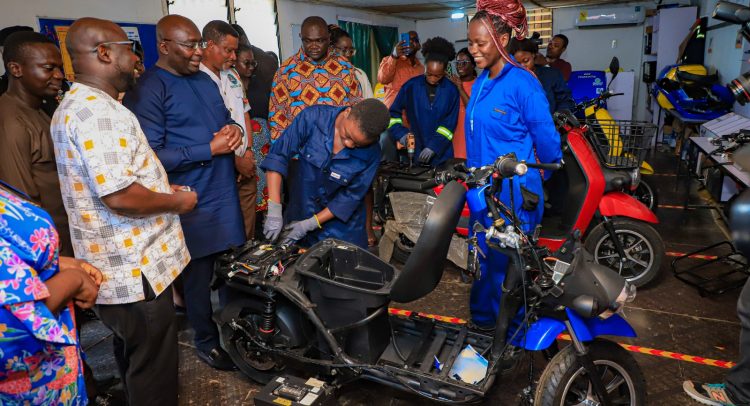Vice President Bawumia has stressed the need to invest more in the production and use of electric cars.
He believes this would not only save the huge cost of buying fuels and maintenance cost but will also save the environment from further pollution.
This was when he paid a familiarisation visit to the premises of Solar Taxi, a ride hailing platform that is serviced solely by electric vehicles in Accra Wednesday afternoon.
He said the e-vehicle company’s vision was in tandem with the government’s agenda to promote the use of electric-based transport system in Ghana to reduce greenhouse gases and ensure cheaper transportation cost.
Apart from that, he said it is also in line with the world’s plan to transition from the use of fossil fuel to renewable energy sources.
He therefore declared government’s support the local electric vehicle assembling firm, Solar Taxi, to scale up its production.
“We’ll support you, you can count on us. We will open the channels and remove the bottlenecks to scale up. This is not about you, it’s about us as a nation”, he said.
Dr Bawumia said it is possible for a e-vehicle company in a developing nation like Ghana to leapfrog those in advanced countries and was optimistic that with the necessary support, Solar Taxi would make a headway in leading the charge in the use of electric vehicles in Ghana and Africa at large.
Meanwhile, he said government is in the process of putting in place a e-vehicle policy framework to guide the use of electric vehicles and was considering inputs from various stakeholders.
He therefore urged heads of the State Transportation Company Limited, Metro Mass Transit and Bus Rapid Transit System (Aayaloloo) to consider partnerships with Solar Taxi, to convert their fossil fuel-based buses into electric ones to reduce their expenditures on petroleum products.
On his part, the Chief Executive Officer of Solar Taxi, Jorge Kwadwo Appiah, said the company started operations in Ghana in 2018 and had so far supplied 500 electric vehicles onto the Ghanaian market.
There were about 460 motorbikes and some tricycles in the northern parts of the country.
He said lack of funds has been a major setback on its ability to scale up production and thus, called for government’s support and potential partnerships with state agencies.
The company however has a plan to establish an electric vehicle plant in Prampram and, thus appealed for tax incentives from the government.
In the next three to five years, he said, it would like to have 10,000 electric vehicles on the Ghanaian market and create 10,000 jobs.
Currently, it rents out electric vans, motorbikes and tricycles to individuals and corporate entities.
The company also has a ride-hailing platform that provides vehicles for drivers on a daily basis with some earning GHc300.00 a day and GHC3,000 per month.
By Charles Takyi-Boadu, Presidential Correspondent


